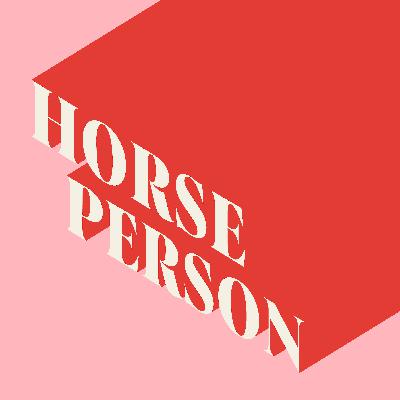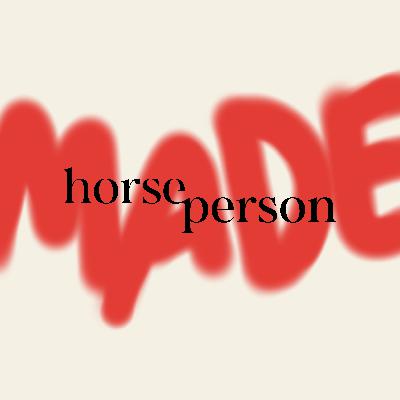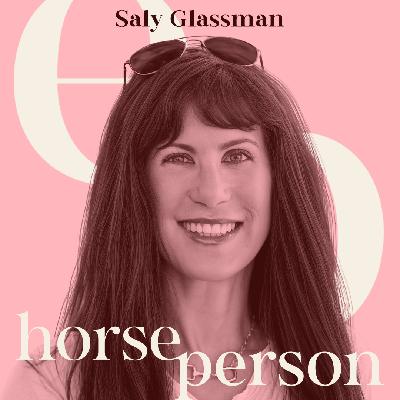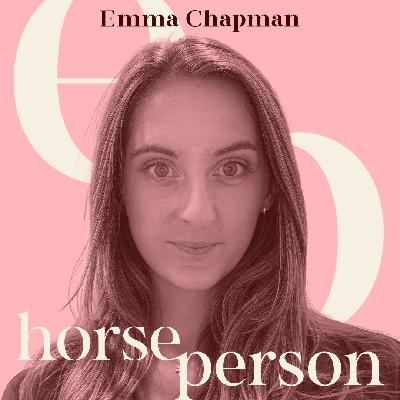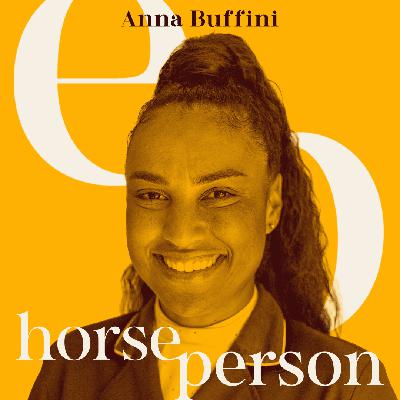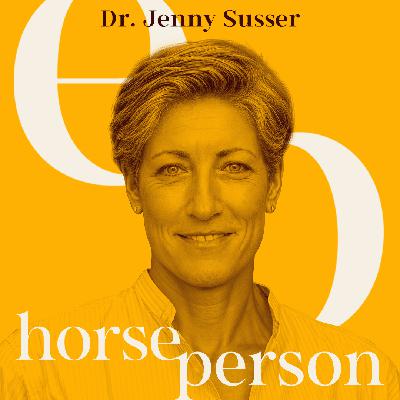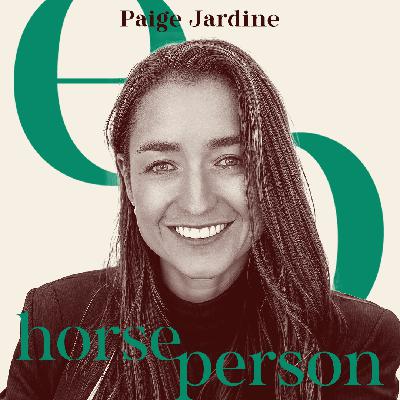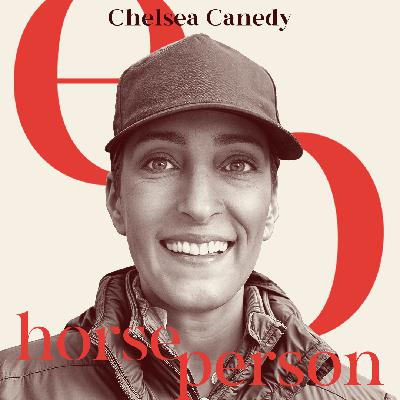Discover Horse Person
Horse Person

Horse Person
Author: Caroline Culbertson
Subscribed: 20Played: 215Subscribe
Share
© 2024
Description
Being a horse person is like this: the more you learn, the more you realize you know nothing... at all. So, with all the different "bubbles" of the horse world, how can we all get into the same room to share a little bit of curiosity, perspective, and humanity with each other? Welcome to Horse Person, the equestrian podcast hosted and produced by 3x award-winning podcaster Caroline Culbertson. Part education, part human-(horse?) interest, all with the ultimate goal of supporting and encouraging you on your journey to become the best horse person you can be.
28 Episodes
Reverse
Caroline interviews USEF Chief of Sport David O'Connor about the newly introduced 'Know the Signs' guidelines aimed at promoting horse welfare in equestrian sports in the US. They discuss the purpose of these guidelines, the emotional dynamics in competition, the role of officials, and the evolving nature of regulations, particularly regarding the use of whips. To view the guidelines, go to https://www.usef.org/horse-welfare/protecting-horses
This episode is proudly sponsored by Nikovian. Use code horseperson15 for 15% off your order at checkout. Perfectionism and an outcome-focused mindset is not only a pretty lousy mindset for performance, but it also makes us miserable. And - relying on results and outcomes when you’re in a sport with a 1200 lb animal who can die suddenly of a stomach ache, or essentially drain your savings account if he steps funny in the field, is just not very low risk. but But luckily, we’re going to go through some strategies to combat perfectionism and reclaim some joy with today’s guest. Dr Darby Bonomi is a sport and performance psychologist who works with riders, entrepreneurs and other business professionals to elevate their game. She work with all disciplines of riders, but mainly hunter/jumper, dressage, and three day eventers, & has been a practicing psychologist for over 30 years. She went to UC Berkeley and then the California School of Professional Psychology. She shows in the amateur owner hunters and has 3 horses. Learn more at www.darbybonomi.com
Trigger Warning: Topics of sexual abuse Join Caroline for a short chat with Carrie Kehring, founder of #WeRideTogether, about the special project highlighting the experience of victims of sexual abuse. Go to www.weridetogether.today to watch the PSAs & roundtable discussions.
This episode is sponsored by Connaway & Associates Equine Insurance Services. I recorded this conversation a couple of months ago, and it has stayed with me ever since. It’s a story of perseverance, of reinvention, and of the quiet power of hope — the kind of story that might just be what you need to hear right now. Because you never know what’s waiting for you around the corner. My guest today is someone many of you will already know by voice: Catie Staszak. You’ve likely heard her on FEI TV, CBS Sports Network, ESPNEWS, or ESPNU. She’s a leading multimedia journalist in the equestrian world and a talented show jumper herself, having made her FEI Grand Prix debut earlier this year. In this episode, Catie opens up in a way we rarely get to hear. She shares the financial strain she’s faced in trying to pursue a career in this sport, her battle with an eating disorder, and becoming a caretaker for her father after his Parkinson’s diagnosis — all while continuing to chase a dream that often felt just out of reach. We talk about the trainer who once broke her confidence as a young rider, and the Olympic rider who later offered her a moment of belief that changed everything. Catie’s story is raw, honest, and incredibly human. Through all the challenges, she’s held on to something that’s too often in short supply in this sport: hope. Hope that even when time, money, or opportunity is limited, the dream is still worth chasing.
This episode is proudly presented by Nikovian. Use code horseperson15 at checkout for 15% off your order. We’re living in a horse world that often rushes. Young horses are expected to mature fast, to progress on human timelines, and to succeed by a certain age—or else we worry they’ve “missed their chance” or they wont be sellable. But today, I’m joined by someone who makes an excellent case for slowing down - wayyy down. For the horse’s physical longevity, but for their mental wellbeing. Today, we’re joined by Zac Salmeron—trainer, horseman, and someone who’s quietly but profoundly changing the way we think about young horse development. His work reminds us that the best progress often comes when we stop trying to prove something, and start meeting horses where they actually are. He’s also going to introduce you to a new idea - the idea that giving a horse years off in their youth might just be the best foundation you can give them—and he’s got proof: horses that are in their 20s and look as robust as a 6 year old, still competing, still joyful in their work. Zac believes training should be simple. Clear. Kind. Sometimes, it’s 10 minutes of work. Nothing more, nothing less—just one thing at a time, until the horse understands. Because when a horse understands, they don’t just obey—they offer. They show up fully. They give 200%, and they even ask questions back. That’s not compliance. That’s partnership. If you’ve ever felt pressure to hurry up—whether in your riding or your life—this episode is your permission slip to slow down and do it right. This episode is supported by #WeRideTogether.today, an organization working tirelessly to end sexual abuse in sport.
In the first interview of this kind, US Equestrian's COO and General Counsel, Sonja Keating, is speaking to the frustrations shared by USEF membership regarding the perceived lack of action and enforcement on horse abuse in sport in the United States. On May 27, the Chronicle of the Horse published an article entitled USEF Must Do Better in Fighting Horse Abuse, written by Caroline Howe. That same day, the United States Equestrian Federation sent an email to its membership which the Chronicle also published on its website, seemingly in response to Caroline’s piece, in which they call for the community to unite against horse abuse and detail a number of measures they have taken, and some that they plan to take, to address horse abuse in sport. It’s clear from Sonja that USEF does acknowledge there’s a lot of room for improvement - but in order to know where we’re going, we have to take stock of what’s not working right now. I think this conversation provided some clarity on the current systems and conversations happening at USEF and the broader horse community around how we’re not preventing and responding to horse abuse well enough. To reach out to USEF, please use the email address feedback@usef.org. Your feedback is encouraged.
On May 27, the Chronicle of the Horse published an article entitled USEF Must Do Better in Fighting Horse Abuse, written by Caroline Howe. That same day, the United States Equestrian Federation sent an email to its membership which the Chronicle also published on its website, seemingly in response to Caroline’s piece, in which they call for the community to unite against horse abuse and detail a number of measures they have taken, and some that they plan to take, to address horse abuse in sport. The response to these 2 articles was massive. On social media alone, they garnered hundreds and hundreds of comments, shares, and the general consensus that the memebrshsip is frustrated with the level of abuse happening to sport horses, and both the lack of action as well as the timeliness of USEF on the matter. I reached out to both the author of the opinion piece - Caroline Howe - and US Equestrian. They both agreed to speak with me to unpack these issues a bit more in a raw, lightly edited for clarity and flow, conversational format. That’s what you’re about to hear. First up, Caroline Howe. Caroline Howe is an amateur hunter/jumper rider who has competed in equestrian sport for over half her life as both an owner and a rider. In 2021, after learning of the dire welfare outcomes many horses face post industry involvement, Caroline founded North Carolina-based Horse Welfare Collective, a 501c3 nonprofit that researches horse industry practices and their impacts on horse welfare. Her work ranges from researching and raising awareness about horse slaughter marketing channels, to consulting across various disciplines and industries to study how we can help competing and noncompeting horses avoid negative welfare outcomes during all phases of their lives. You can contact Caroline Howe via her website - horsewelfarecollective.org
This special LIVE episode is made possible by Nikovian. Use code horseperson15 to get 15% off your entire order at checkout. This episode is also supported by WeRideTogether.today. We all have a part to play in preventing abuse and misconduct in equestrian sports. Learn more on their website. Dr. Jenny Susser is a renowned, Olympic level sport psychologist who has supported athletes from the beginner level through the Olympic game in all sports, but specializes in equestrian sports. Dr. Jenny joined us on a LIVE call-in show to answer 3 horse person podcast listener questions. Want to join the next one? Email me - caroline@horsepersonpodcast.com
This episode is sponsored by Connaway & Associates Equine Insurance Services. Welcome to Horse Person: MADE — where we explore the stories behind the brands, businesses, and visionaries shaping the horse world. This isn’t just about entrepreneurship — it’s about the real, human journey: the risks, the resilience, the detours, and the drive it takes to build something meaningful in this industry. This is Olympic show jumper Daniel Bluman, documenting how he built Bluman Equestrian from a small family business that he founded at 20 years of age, and turned it into a global, multi-pronged equestrian business encompassing many equestrian professionals and areas of the industry. Learn more about Bluman Equestrian: https://www.blumanequestrian.com/ Learn more about Fairfield County Hunt Club: https://fairfieldhuntclub.com/ Learn more about Blue Star Equestrian: https://www.bluestareq.com/ Learn more about Urim Therapeutic Center: https://urimtherapy.com/
This episode is presented by Nikovian. Use code horseperson15 for 15% off your order. The bit is one of the most powerful—and potentially harmful—tools we use, yet most riders choose one without fully understanding its impact. In this episode, we unpack why choosing a bit and understanding that bit is actually a huge responsibility that we really need more focus and more education on. I’m joined by Mette Larsen who is one of the most knowledgeable sources of bit fitting and bit choice information here in the states. Mette Larsen is the president of Neue Schule USA and a lifelong equestrian who has dedicated her career to improving horse welfare through innovative bitting solutions. A successful dressage rider and also a board-certified physician, Mette's commitment to ethical, science-based horsemanship has made her a respected advocate for better communication and comfort between horse and rider. You can expect to learn about the most common bit fitting mistakes, what to understand about the horse’s mouth because it was designed for eating and drinking (not for carrying a bit!), and what you can do the next time you go to the barn to determine if you’re one of the 80-90% of riders who have a sub-optimal bit in your horse’s mouth - according to your horse’s mouth anatomy, training, and preferences. This episode is supported by #WeRideTogether. To learn more about the CARD diagrams mentioned in today's episode, go to WeRideTogether.today or click here.
This episode is presented by Nikovian. Saly Glassman spent nearly four decades leading one of the largest retail investment practices in the world, but she walked away to help people heal through horses, and isn't looking back. In this episode, we dive into how Saly combined her passions for psychology, philanthropy, and horsemanship to create the Kindle Hill Foundation, a cutting-edge equine-assisted therapy center serving first responders and individuals facing anxiety, PTSD, depression, and more. The wisdom about horses and humans that she has gained through this process will be of value to every person who tunes into this conversation. Saly has helped over 800 police officers, firefighters, dispatchers, and paramedics find emotional regulation and connection through the horse-human bond—and she’s challenging all of us to rethink what we call a “relationship” with our horses. 🔗 Learn more about the Kindle Hill Foundation: https://www.kindlehillfoundation.org 📲 Share this episode with someone who needs to hear it.
Emma Chapman has been a professional groom at the top of show jumping competition for almost 2 decades and in that time, she's learned a thing or two. Today, we get to learn from her. Emma, who manages WEG gold medalist Adrienne Sternlicht's operation, gives us an inside look at the essential role of grooms in horse care and competition. We also dive into the evolving career path for grooms and what needs to change to improve working conditions in the industry. Plus, Emma offers a candid look at how she balances life as a new mom with the demands of professional horse care. We also discuss: - Differences between Europe and the U.S - How and why contracts are more rare in the US than Europe - The importance of movement and turnout for equine health - Why better working conditions for grooms benefit everyone - How, really, no one has life with kids figured out (and that's okay!) One thing is clear: if you want to understand and support top-level sport, look to the grooms. This episode is presented by Connaway & Associates Equine Insurance Services. Learn more at www.connaway.net This episode is also supported by #WeRideTogether. Reach out to the team for FREE safeguarding resources for your barn: info@weridetogether.today
You know her from riding in the biggest arenas in the world as an elite US dressage rider, or from her beloved social media following documenting her life as a top athlete. But there's so much more to Anna Buffini and her story than what meets the eye, and today, we're peeling back some of the layers on this incredible young woman who is rightly becoming a role model for many up-and-coming riders. This episode is proudly presented by Connaway and Associates Equine Insurance Services. Anna, 30, who trains with her longtime trainer, Olympic bronze medalist Guenter Seidel, shares her high highs, her low lows, and how she's found sturdiness in a sport and lifestyle that often feels unpredictable and out of control. We talk about: How she's built her mental strength to allow her to 'control the controllables' The best lesson she ever learned from her trainer The value of putting herself out there on social media in a sport that is often conservative and... let's face it... a bit judgemental. Her faith and how it has affected her worldview as a top athlete The moment she decided her fitness needed to become a top priority Dressage being a subjective sport vs. objective sport The lessons she learned from her parents, who were also successful athletes in other sports The heartbreaking moment her Olympic dreams evaporated ahead of Paris This episode is supported by WeRideTogether.today. For more information on the response reporting guide mentioned in this episode, go here: https://www.weridetogether.today/blog-posts/response-reporting-guide
If the only things certain in life are death and taxes, we sure do a poor job talking about the former. Let's change that. In this heartfelt conversation, Caroline Culbertson and renowned sport psychologist Dr. Jenny Susser explore the complexities of grief, particularly in relation to the loss of beloved horses. They discuss personal experiences with anticipatory grief, the emotional toll of preparing for loss, and the challenges of communicating about death. Dr. Jenny shares her recent experiences with the loss of two horses only weeks apart, highlighting the stark differences between expected and unexpected losses. They discuss the importance of recognizing the physical and emotional toll of grief, and the necessity of managing personal energy during difficult times. Grief is an all-consuming physical, emotional, and spiritual process, and it’s time we talk about it as such. This episode is supported by WeRideTogether - a nonprofit organization created to cast light upon the endemic issue of sexual abuse in youth and amateur sports. Their mission is to make the youth and amateur sport environment safer for all athletes. For more information from today's episode, as well as free resources, go here. 00:00 Navigating Grief: Personal Experiences and Reflections 14:53 The Impact of Anticipatory Grief 30:08 The Language of Loss: Communicating Grief 45:13 Finding Presence Amidst Worry 44:43 Understanding Energy and Grief 50:06 Protecting Mental Space During Grief 54:28 The Physical Manifestations of Grief 01:01:06 The Complexity of Anger in Grief 01:05:15 The Permission to Grieve 01:12:07 Finding Permanence in Loss To learn more about Dr. Jenny Susser and her work, visit her website, www.DrJenny.com
Paige Jardine is a 5* Australian show jumper whose symptoms started small. Some discomfort, some nausea. But as time went on and she kept pushing through, with doctors providing little insight or treatment, things got worse, until she collapsed at the ingate during an FEI show. Paige spent years seeking a diagnosis, and is now speaking out about the power of removing the shame from women's health issues, especially in a sport that is majority female. In this conversation, Paige shares her deeply personal journey through mental health struggles and the diagnosis of endometriosis. She discusses the impact of self-doubt, the pressure to maintain appearances, and the importance of seeking help. Paige shares with us the power of knowing: the power of knowing your diagnosis, of knowing you're not 'crazy' for feeling the way you do, and the power of knowing your limits along the way.
If you’ve ever had a horse turn and walk away from you in the field when you’re trying to catch them, or turn away from you in the stall - you are so not alone. That moment can be confusing, annoying - at best it’s inconvenient and at worst it’s dangerous. But we’re going to walk through understanding this avoidant behavior today, give you some perspective on how to understand why your horse is doing it, and then an effective approach on how to address the behavior - and it doesn’t involve force or bribery - this is a proper fix with no shortcuts. My guest today is Chelsea Canedy. Chelsea is an event rider who specializes in groundwork and understanding horse behavior - she’s based in Ocala Florida and southern Maine. Chelsea and I talk about identifying this behacvior when it’s still small and subtle, why it never really comes out of nowhere, how to become a detective about the problem, and then 2 strategies to address the behaviour - one specifically on catching the horse and another on breaking up negative associations your horse might have that is triggering this behavior. And before we start, we do want to underline that pain needs to always be a factor in figuring this behavior out - that can involve your vet, your bodyworker, your saddle fitter, and/or your farrier. To learn more about Chelsea, visit her Patreon page. This episode is sponsored by WeRideTogether.today. For information from today's episode on Role Plays, go here. Today's episode is also sponsored by Antu Creative. To learn more about Jade and her design services, go here,
Money is a factor in our sport - there's no getting around that. But dang if it isn't encouraging when we hear stories of riders who have made their way without extravagant wealth, by doing it themselves, and while prioritizing their horses' well-being. That's the story we have for you today with Skylar Wireman. Skylar Wireman has been called 'The future of show jumping', but she hasn't let her impressive transition from successful junior to 5* pro stop her from keeping things fun. Whether it's camping, riding at the beach and in the ocean, or playing gymkhana-type games on horseback, Skylar has put her focus on building her village and keeping fun central to her and her horses' training. And much of her competitive success has been on borrowed horses, catch rides, or homebred horses that she's developed herself with the help of her mom, Shayne. In this episode, Caroline sit down with Skylar to talk about all of this, plus course riding strategy, the balance between being a horse trainer and a competitor, the idea of "reset rounds", how to choose shows when you don't have an unlimited checkbook, and more. This episode is proudly sponsored by Connaway and Associates Equine Insurance Services. Listen in around 24 minutes for Laura's discussion on age restrictions on insurance policies in horses and how they may be changing. It is also supported by We Ride Together -- because every athlete deserves to train and grow in a safe and healthy environment.
Have you ever felt like it was hard to find your place in the horse world? Maybe you didn't want to be a pro rider, but you wanted to be involved more than just as a hobby. You didn't feel pulled down the veterinary route, but your grades in biology didn't cut it (Caroline raises hand). There are so many ways to be involved, professionally or not, in horses - and Tori Repole is joining us today to help us peel apart the layers of the horse world so that we can all find our little nook. In this conversation, host Caroline Culbertson and award-winning equestrian journalist (turned philanthropist) Tori Repole discuss the importance of accessibility and inclusivity, the beauty of sport that captured Tori's heart, and her personal journey from a non-equestrian childhood to becoming a voice in the industry. We explore the role of photography and writing in shaping public perception, especially during events like the Olympics, and emphasize the need for storytelling that highlights the diverse contributions within the equestrian community. Tori shares her passion for storytelling through her docuseries concept, 'Top Sport,' and the personal growth that comes from hitting play on your ideas. Today's episode is sponsored by We Ride Together. Their website has loads of free resources for you to help promote safety for all athletes, including minors, at your barn and at shows. Check out their Athlete Toolkit as mentioned in this episode. Today's episode is also sponsored by Nikovian - luxury equestrian training and showing apparel without the luxury pricetag. Size inclusive and made to move with you and enhance your riding, rather than hinder it, this brand is one of our much-loved breech brands in the equestrian space. Use code horseperson15 for 15% off your order at Nikovian.com
'How can I improve my riding outside of the saddle?' 'How can I become a calmer competitor?' 'I only have x hours to ride per week, how can I still make progress?' While there are tons of resources for horse/riding/training education (hit us up if you need some recommendations!), today's episode is focused on how to become a calmer, more focused, more balanced rider when you DO get that barn time or when you enter into the competition ring. These are areas of focus for life, not just momentary tricks, and this is an episode you'll be able to refer back to time and again when you need to refocus. Learn more about today's guest, Aoife Leggett, at her website Three Sixty Coaching. Today's epside is sponsored by We Ride Together. Their website has loads of free resources for you to help promote safety for all athletes, including minors, at your barn and at shows. Check out their current events tab to learn more about the prevalence of sexual abuse in sport and see the latest headlines. Today's episode is also sponsored by Nikovian - luxury equestrian training and showing apparel without the luxury pricetag. Size inclusive and made to move with you and enhance your riding, rather than hinder it, this brand is one of our much-loved breech brands in the equestrian space. Use code horseperson15 for 15% off your order at Nikovian.com
Lessons from an FEI dressage rider for $5? What's the catch? That was my reaction - and the reaction of lots of other riders - when they saw Meghan Laffin's post. But on further investigation, this was an approach to a multi-pronged problem that Meghan identified in the dressage industry: 1) Many riders are feeling the financial strain of pursuing their goals in their sport, 2) Many riders felt alone, or too embarrased to seek help and 3) There's not always a clear path to improvement, let alone success, so having a fresh set of eyes and a professional take on your situation could prove valuable. Besides, Meghan had spent most of her career in horses riding, and wanted to improve her coaching skills. It was a win-win. She’s now taught over 100 of these lessons and in this episode shares what she's learned from the wide array of riders that she was able to support over this 4-month experiment. Meghan Laffin is a 31-year-old dressage rider who is also the assistant trainer for Olympic dressage rider, Kasey Perry-Glass. Meghan has taken Diane Perry’s mare Stina from First Level to I-1 and aims to start doing the small tour in 2025. Meghan also has her MBA from UC-Davis, is a former producer at CBS News, and was a division 1 volleyball player at Coastal Carolina University. This is the story of what $5 lessons taught Meghan, and the students who took her up on her crazy offer. Thanks for listening. This episode is proudly supported by We Ride Together, a nonprofit organization created to cast light upon the endemic issue of sexual abuse in youth and amateur sports. Their mission is to make the youth and amateur sport environment safer for all athletes. To access the blog post mentioned in this episode, click here. This episode is also supported by Nikovian - equestrian riding apparel for home or for shows that feels and performs like luxury, but without the luxury price tag. Use code horseperson15 at checkout for 15% off your purchase.


